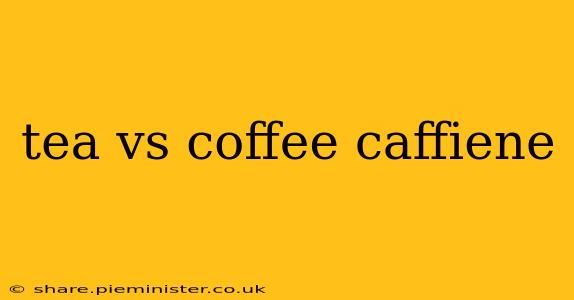The age-old debate: tea versus coffee. Both beloved beverages offer a comforting warmth and a much-needed caffeine boost, but which one reigns supreme? This in-depth comparison delves into the caffeine content of tea and coffee, exploring the factors that influence caffeine levels and helping you make an informed choice for your daily dose.
How Much Caffeine is in Tea vs. Coffee?
The caffeine content of both tea and coffee is highly variable, depending on several factors. There's no single definitive answer. However, we can establish some general guidelines.
Coffee: A typical 8-ounce cup of brewed coffee contains anywhere from 80 to 170 milligrams (mg) of caffeine. This range depends on the type of bean, roast level, brewing method, and the amount of coffee grounds used. Espresso tends to have a higher concentration of caffeine per ounce.
Tea: Tea's caffeine content is significantly lower than coffee's, generally ranging from 14 to 60 mg per 8-ounce cup. However, this dramatically depends on the type of tea. Black tea typically has more caffeine than green tea, white tea, or herbal teas (which often contain little to no caffeine). Steeping time also plays a role; longer steeping times generally extract more caffeine.
What Factors Influence Caffeine Levels?
Several key factors influence the caffeine content in both tea and coffee:
- Type of Bean (Coffee): Arabica beans generally have less caffeine than Robusta beans.
- Roast Level (Coffee): Darker roasts often contain slightly less caffeine than lighter roasts, although the difference isn't substantial.
- Brewing Method (Coffee): Different brewing methods extract caffeine at varying rates. Espresso typically has a higher concentration per ounce than drip coffee.
- Type of Tea: Black tea usually has the highest caffeine content among true teas, followed by green tea and white tea. Herbal infusions are typically caffeine-free.
- Steeping Time (Tea): Longer steeping times extract more caffeine from tea leaves.
- Amount of Grounds/Leaves: Using more coffee grounds or tea leaves will result in a stronger brew with higher caffeine levels.
Is Tea or Coffee Better for You?
The "better" beverage depends entirely on individual preferences and health considerations. Both coffee and tea offer potential health benefits, including antioxidants and potential cognitive improvements. However, excessive caffeine intake can lead to anxiety, insomnia, and digestive issues. Moderation is key.
Does Decaf Tea/Coffee Still Have Caffeine?
Even decaffeinated tea and coffee contain some caffeine. The decaffeination process removes the majority of caffeine, but a small amount typically remains. While significantly lower than regular versions, it's crucial to note that decaf isn't completely caffeine-free.
Which Has More Caffeine: Black Tea or Green Tea?
Black tea generally has more caffeine than green tea. The processing methods for black tea result in higher caffeine concentrations.
Is Caffeine in Tea Different Than Caffeine in Coffee?
The caffeine molecule is the same in both tea and coffee. However, the presence of other compounds in tea and coffee might influence how the caffeine is absorbed and metabolized by the body. Some research suggests that tea's other components may slow down the absorption of caffeine, potentially leading to a gentler, longer-lasting effect compared to coffee.
Conclusion: Choosing Your Caffeine Fix
The choice between tea and coffee comes down to personal preference. Consider your caffeine tolerance, desired energy levels, and flavor profiles. Whether you opt for the bold intensity of coffee or the subtle nuances of tea, mindful consumption is key to enjoying these beverages responsibly. Experiment to find the brew that best suits your needs and tastes.
